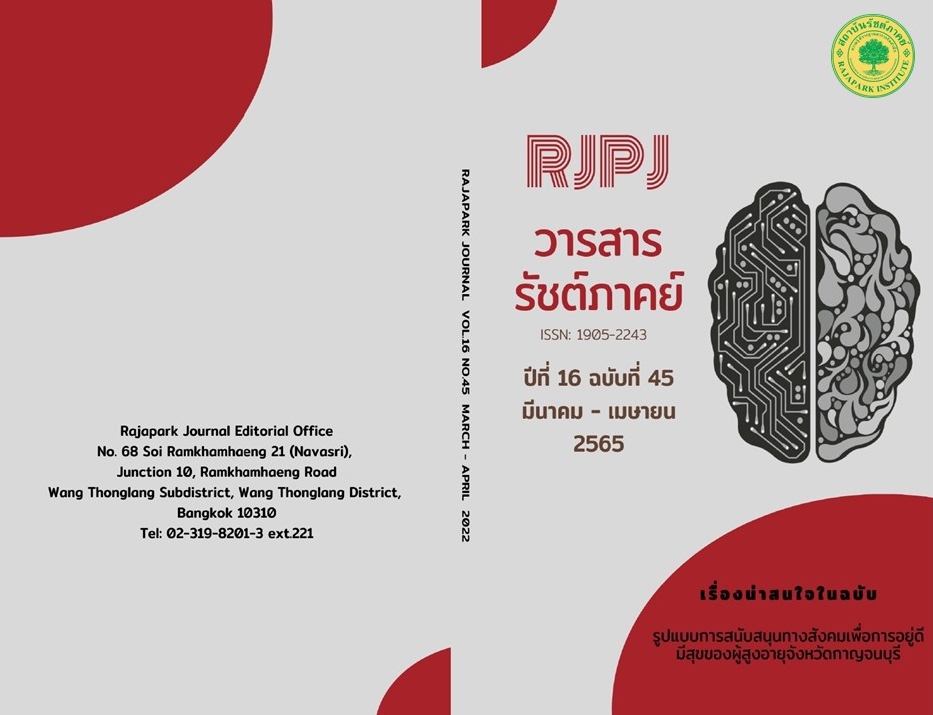ปัจจัยด้านการตลาดที่มีผลต่อการตัดสินใจเลือกใช้บริการร้านอาหารญี่ปุ่น ในซอยสุขุมวิท 55 เขตกรุงเทพมหานคร
Main Article Content
บทคัดย่อ
การวิจัยนี้มีวัตถุประสงค์เพื่อศึกษาปัจจัยที่มีอิทธิพลและพฤติกรรมการบริโภค โดยเป็นการวิจัยแบบผสมผสานระหว่างเชิงปริมาณและเชิงคุณภาพ กลุ่มตัวอย่าง คือ ผู้บริโภคร้านอาหารญี่ปุ่น จำนวน 385 คน เชิงปริมาณโดยการสุ่มแบบสะดวก ระหว่างเดือนกันยายนถึงพฤศจิกายน 2562 และเชิงคุณภาพโดยการสัมภาษณ์ผู้บริหารหรือเจ้าของร้านอาหารญี่ปุ่น จำนวน 2 ร้าน เครื่องมือที่ใช้ คือ แบบสอบถามและการสัมภาษณ์ ผลการวิจัยพบว่า 1) เพศหญิงนิยมรับประทานอาหารญี่ปุ่นมากกว่าเพศชาย เนื่องจากไขมันต่ำและมีคุณค่าทางโภชนาการต่อร่างกาย คำแนะนำสำหรับผู้ประกอบการร้านอาหารควรทำโปรโมชั่นที่สามารถดึงดูดใจผู้หญิงได้จะเป็นการตลาดที่ประสบความสำเร็จได้ตามเป้าหมายที่ตั้งไว้ 2) วัตถุประสงค์หลักในการใช้บริการของผู้บริโภคเพื่อรับประทานอาหารซึ่งมีความถี่ในการใช้บริการ 1-2 ครั้ง/เดือน ระหว่างวันจันทร์–ศุกร์ เวลา 18.01 - 20.00 น. ใช้บริการ 1-2 ชั่วโมง กับเพื่อน/เพื่อนร่วมงานประมาณ 3-4 คน สั่งอาหารโดยดูจากเมนู/รายการอาหาร โดยมีค่าใช้จ่ายเฉลี่ยต่อครั้ง 1,001-2,000 บาท ชำระด้วยบัตรเครดิต เดินทางโดยรถยนต์ส่วนตัว และ 3) ปัจจัยด้านการตลาดหลัก คือ ด้านผลิตภัณฑ์ และราคา รองลงมา ส่วนค่านิยมการบริโภคอาหารญี่ปุ่น ส่วนใหญ่เพื่อต้องการอยากลองรับประทานอาหารใหม่ ๆ มากที่สุด ผู้ประกอบการในธุรกิจร้านอาหารญี่ปุ่นต้องมีการปรับกลยุทธ์ นำเสนออาหารที่แปลกใหม่เพื่อตอบสนองความต้องการของผู้บริโภค และเป็นการดึงดูดให้ผู้บริโภคอยากเข้ามาใช้บริการร้านอาหารมากยิ่งขึ้น
Article Details

อนุญาตภายใต้เงื่อนไข Creative Commons Attribution-NonCommercial-NoDerivatives 4.0 International License.
ทัศนะและความคิดเห็นที่ปรากฏในวารสาร ถือเป็นความรับผิดชอบของผู้เขียนบทความนั้น และไม่ถือเป็นทัศนะและความรับผิดชอบของกองบรรณาธิการ
เอกสารอ้างอิง
Best, J. W. (1981). Likert Method, Research in Education (4th ed.). Eaglewood Cliffs. N.S.: Prentice-Hall.
Boonsin, P. (2019). Factors Affecting Food Consumption Behavior through Fuji Japanese Restaurant in the Department Store in Bangkok Metropolitan Area(Independent Study). Silpakorn University.
Central Registration Office, Department of Provincial Administration, Ministry of Interior. (2020). Demographics in Thailand. Retrieved January 30, 2021, from http://www.bora.dopa.go.th/index.php/th/
Chaloemjirarat, W. (2015). Service Quality. Bangkok: Duagnkamol.
Charoenwiriyatham, N. (2018). Service Marketing Mix Factors Affecting Japanese Restaurant Service Choosing Decision of Consumer in the Department Store in Bangkok(Independent Study). Chiangmai University.
Dechakub, J. (2016). Service Psychology. Bangkok: Sukhothai Thammathirat Open University.
Feather, N. T. (2016). Value in Education and Society. New York: Collier Macmillan.
Gronroos. (2015). Service Management. Finland: Christian Grönroos Association.
Kasikorn Research Center. (2019). Japanese Restaurant Business. Retrieved October 25, 2019, from http://www.oknation.net/blog/print.php?id=25751.
Kasikorn Research Center. (2021). Japanese Restaurant Business in 2021. Retrieved January 5, 2021, from http://www.kasikornresearch.com/search_detail.jsp?id=9057&cid=5
Millet, J. D. (2014). Management in the Public Service. New York: McGraw-Hill.
Na-Nan, K., Juangtrakul, J., Sanamthong, A., & Pakkiri, P. (2014). Research Philosophy. Journal of Management and Marketing, Rajamangala University of Technology Thanyaburi, 1(2), 1-12.
Nochai, H. (2017). Consumer Behavior Through the Service of Japanese Restaurant in Chiangmai City(Independent Study). Chiangmai University.
Nuntapaibun, J. (2018). Service Psychology. Bangkok: SE-EDUCATION.
Nuthong, P. (2014). Choosing the Belt System Buffet Japanese Restaurant Service Through Consumer in Chiangmai City(Independent Study). Maejo University.
Raths, L. E., Harmon, M., & Simon, S.B. (1966). Value and Teaching. Columbus, Ohio; Charles E. Merrill Books.
Serirat, S. (2015). Consumer Behaviour (Revised ed.). Bangkok: Teerafilm & Si-Tech.
Serirat, S. (2019a). Marketing Strategy and Marketing Management. Bangkok: Thammasarn.
Serirat, S. (2019b). Modern Marketing Management (Revised ed.). Bangkok: Thammasarn.
Thansettakij. (2018). The Japanese Restaurant Business is still in Popularity. Retrieved May 15, 2019, from http://thannew.th.com/detaiINews.php?id=M2422141&issue=2381
Thansettakij. (2020). Japanese Restaurant Business in Thailand. Retrieved March 7, 2020, from
http://thannew.th.com/detaiINews.php?id=M2422341&issue=2794.
Yamane, T. (1967). Statistics: An Introductory Analysis (2nd ed.). New York: Harper and Row.


